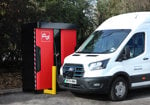The suggestion of negotiating with HM Revenue and Customs (HMRC) to temporarily increase the rate of reimbursement as outlined in the Fleet NewsNet article ‘Fuel prices spark HMRC fuel deal’ (October 6) may keep drivers happy but is guaranteed to put pressure on fleet budgets. And this is only a short-term solution and one that does not address the underlying problem of rising costs.
With the promise of any fuel costs being reimbursed it is difficult to persuade most company car drivers to switch to a more fuel efficient vehicle, especially if, as the article suggests, it is those in the smallest-engine vehicles that are bearing the brunt of rising costs (HMRC only raised rates for vehicles over 2,000cc in July).
‘Fuel efficient’ for many also equals smaller and it is not a popular manager who demands an employee opts for a smaller car when choosing their next vehicle.
However, there is an easier and longer term solution that does not require a sudden change in vehicle and is particularly relevant to sorting out the problem of reduced fuel efficiency in stop-start traffic.
Often described as ‘eco-driving’, the Energy Saving Trust offers free advice and tips for increasing fuel efficiency, reducing maintenance costs while cutting carbon dioxide (CO2) emissions.
The following simple steps can help every company car driver improve mpg and ease the pressure on their wallets and the company fleet budget.















Login to comment
Comments
No comments have been made yet.